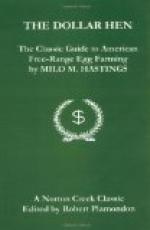Likewise, with brooder chicks, we must divide the credit of their livability in an arbitrary fashion between parentage, incubation, and care after hatching.
By the hatchability of eggs, we then mean the percentage of eggs set that hatch chicks able to walk and eat. By the livability of chicks, we mean the percentage of chicks hatched that live to the age of four weeks, after which they are subject to no greater death rate than adult chickens. By the livability of eggs, we mean the product of these two factors, i.e.: the percentage of chicks at four weeks of age based upon the total number of eggs set.
As before mentioned, the fertility of eggs bears fairly definite relation to the hatchability, so likewise the hatchability bears a relation to the livability of chicks. When poor hatches occur because of weak germs, as because of faulty incubation, this same injury to the chick’s organism is carried over and causes a larger death among the hatched chicks.
Moreover, the relation between the two is not the same with all classes of hatches, but as hatches get poorer the mortality among the chicks increases at an accelerating rate. The following table gives a rough approximation of these ratios:
Per cent. of Per cent. of chick Per cent. of egg Hatchability. Livability. Livability. 100 100 100 90 95 85 80 88 70 70 84 50 60 72 43 50 55 27 40 40 16 30 24 7 20 10 2 10 2 1
These figures are based on incubator data. Eggs set under hens usually give a hatchability of 50 per cent. to 65 per cent., and livability of 70 per cent. to 80 per cent. The reason for the greater livability is that the real hatchability of the eggs is 70 per cent. to 75 per cent., and is reduced by mechanical breakage. The hatchability of eggs varies with the season. This variation is commonly ascribed to nature, it being stated that springtime is the natural breeding season, and therefore eggs are of greater fertility.
While there may be a little foundation for this idea, the chief cause is to be found in the manner of artificial incubation, as will be discussed in a later section of this chapter. The following table is given as the seasonable hatchability for northern states. This is based on May hatch of 50 per cent:
January 38 July 40 February 42 August 40 March 47 September 42 April 49 October 43 May 50 November 40 June 46 December 35
Most people have an exaggerated idea of the hen’s success as a hatcher. I have a number of records of hen hatching with large numbers of eggs set, and they are all between 55 per cent. and 60 per cent. The reasons the hen does not hatch better are as follows:




